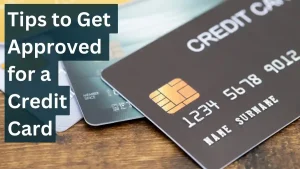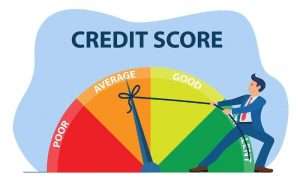Your credit score is an essential aspect of your financial life. It determines your ability to secure loans, mortgages, and other forms of credit.
Therefore, it is vital to maintain a good credit score. However, many people often make mistakes that hurt their credit scores without even realizing it.

In this article, we will discuss some of the most common credit score mistakes you could be making that can hurt your credit score – and how to avoid them.
Introduction to Credit Scores
Before we dive into the common mistakes that can hurt your credit score, let’s briefly discuss what a credit score is and how it is calculated.
Your credit score is a three-digit number that ranges from 300 to 850. The higher the score, the better your creditworthiness. Credit scores are calculated based on several factors, including payment history, credit utilization, length of credit history, types of credit used, and new credit applications.
If you have good credit, you can have many benefits on your way to a house, car, or mortgage. Or anything else you want much more accessible. On the contrary, if you have a terrible credit score, it can be tough to get any credit.
Credit Card Mistakes That Will Hurt Your Credit Score
#1. Late Payments
One of the most common mistakes that can hurt your credit score is making late payments. It will lower your credit score, simple as that.
Your Payment history makes up 35% of your credit score and is one of the major factors in the credit scoring formula, so missing a payment or paying late can significantly impact your credit score. Even one late payment can send it plummeting, affecting your score massively.
Therefore, it is essential to pay your bills on time.
A missed payment can stay on your credit report for up to 7 years.
Fix: You can ensure you don’t miss your payment by keeping track of your payment schedule on a calendar, requesting payment reminders from your lenders, and setting up autopay through your lender or bank account. Just make sure you have enough balance in your bank account each month to cover your bill.
#2. Maxing Out Your Credit Cards / High Credit Card Balances
Another mistake that can hurt your credit score is high credit utilization or maxing out your credit card.
Credit utilization, or the amount of credit you use compared to your credit limit, makes up 30% of your credit score. Your credit utilization rate is calculated by dividing the amount of credit used Vs. the amount of credit extended/available to you. If you have a limit of $5,000 and you have used $2,000, you would divide $2,000 by $5,000 to get a utilization ratio of 0.20 or 20%.
A High credit utilization indicates that you are using a lot of your available credit, which can negatively impact your credit score.
Therefore, it is essential to keep your credit card balances low.
Note: If you have maxed-out cards or are close to maxed out, the credit lenders don’t want to give you new credit.
Fix: It would be best if you were somewhere around 10-30% credit utilization instead.
#3. Closing Old Credit Card Accounts
Closing old credit card accounts is a fast and easy way to hurt and lower your credit score.
The length of your credit history makes up 15% of your credit score, and closing old credit card accounts can shorten your credit history, which can negatively impact your credit score.
When you close down your accounts, you reduce their available credit, you get rid of the positive payment history on the account, and you lower your average account age, which could cause your total credit utilization rate to go higher.
Therefore, it is essential to keep your old credit card accounts open, even if you do not use them.
Note: It is recommended to keep your credit utilization ratio under 30%.
Fix: Before you close the old accounts or do anything, learn how to close a credit card correctly. It probably makes more sense to keep the account active and straightforwardly cut off the physical card and not use it.
#4. Applying for Too Many Credit Cards
Applying for too many credit cards in a short period can also hurt your credit score.
You want a credit card that can help you increase your credit score, but if you keep getting way too many cards, it starts to decrease your score.
Each time you apply for credit, especially within a short period, a hard inquiry is added to your credit report, which can negatively impact your credit score. It can also give lenders the impression that you are desperate for credit.
Fix: Therefore, it is essential to only apply for credit when you need it and to spread out your credit applications over time.
#5. Not Checking Your Credit Report
Not checking your credit report regularly can also hurt your credit score. If you’re not paying attention to your credit report, you could have errors you don’t know about.
Errors in your credit report can negatively impact your credit score, so it is essential to check your credit report regularly and dispute any errors you find.
Note: Monitoring your credit score is a good way to keep track of your progress and also spot potential issues and address them before they do significant damage.
Fix: You can check your credit report and score as often as you would like without damage to your credit score. Many sources, including Experian, also provide free access to your credit scores and update them regularly.
#6. Co-signing for Someone Else’s Loan
Co-signing for someone else’s loan can also hurt your credit score.
When you co-sign for a loan, you are taking on responsibility for that loan, and if the borrower defaults on the loan, it can negatively impact your credit score. Also, if the payments are late or missed, you get a negative hit on your credit score.
Note: Taking responsibility for another person might backfire if that person doesn’t take action on late payments and loan defaults.
Fix: Therefore, it is essential to think carefully before co-signing for someone else’s loan.
#7. Ignoring Debt
Ignoring debt can also hurt your credit score.
Unpaid debt can result in late payments, defaults, and even bankruptcy, all of which can negatively impact your credit score.
Therefore, it is essential to address your debt and make a plan to pay it off.
#8. Not Diversifying Your Credit Mix
Not diversifying your credit mix can also hurt your credit score.
Your credit mix makes up 10% of your credit score, and having a mix of different types of credit, such as credit cards, auto loans, and mortgages, can positively impact your credit score.
Therefore, it is essential to diversify your credit mix
#9. Filing for Bankruptcy
Filing for bankruptcy can have a severe impact on your credit score, typically costing 100 points or more, as per FICO.
Also, bankruptcy can stay on your credit report for up to 10 years and can negatively impact your ability to secure credit in the future.
Therefore, it is essential to explore all other options before considering bankruptcy.
#10. Not Communicating with Creditors
Not communicating with creditors can also hurt your credit score.
If you are experiencing financial difficulties and cannot make payments on time, it is essential to communicate with your creditors and work out a payment plan.
Ignoring your creditors can result in late payments and defaults, which can negatively impact your credit score.

The Bottom Line
Maintaining a good credit score is essential for your financial well-being.
By avoiding the common credit card mistakes discussed in this article, you can protect and improve your credit score.
Always remember to pay your bills on time, keep your credit card balances low, diversify your credit mix, check your credit report regularly, communicate with your creditors, and think carefully before co-signing for someone else’s loan.
The goal is – at any cost you have to avoid these credit card mistakes that will hurt your credit score.
FAQs – Mistakes That Will Hurt Your Credit Score
1. How often should I check my credit report?
It is recommended that you check your credit report at least once a year.
2. How can I improve my credit score?
You can improve your credit score by paying your bills on time, keeping your credit card balances low, diversifying your credit mix, and checking your credit report regularly.
3. How long does it take to improve my credit score?
Improving your credit score takes time, and there is no magic formula. However, by consistently practicing good credit habits, you can see improvement over time.
4. Can I remove negative items from my credit report?
If there are errors on your credit report, you can dispute them and have them removed. However, accurate negative items, such as late payments and defaults, will stay on your credit report for a certain period.
5. Can I get a loan with a bad credit score?
Yes, you can get a loan with a bad credit score. However, it may be more challenging to secure a loan with a bad credit score. You may have to pay higher interest rates and fees. It is essential to explore all options before securing a loan with a bad credit score.
6. What causes your credit score to drop 100 points?
Filing for Bankruptcy would cause your credit score to drop 100 points or more.
7. What can lower your credit score?
Various mistakes such as Late Payments, Maxing out credit cards, applying for too many credit cards, and co-signing for someone else’s loan could reduce your credit score.


